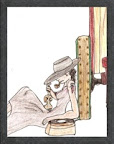The Progress of Other Gods' Pilgrims
My children have for a few years now been slowly working through a best of list of literature for children, broken down by age group. My eldest is in a group of books now that has what I found to be a curious choice: John Bunyan's Pilgrim's Progress. Not to say the book is inappropriate for children. Its not, it is, in fact, probably throughout history one of the books children read, depending on the time period and nation. Historical New England comes to mind. Its just that... well, its an allegory. We don't really read allegory anymore - or when we do, its been swallowed almost entirely by the self-help genre.
Which is, after all, not so strange a thing. Pilgrim's Progress is, more or less, a self-help book, the old Protestant equivalent of, say, The Alchemist, a book that is meant to tell a story mostly only in order to keep you from being bored long enough that it can tell you what to think. I say that, and it sounds like I hate Pilgrim's Progress - I don't. I thought it was more ridiculous when I was younger. I don't know.
The difference, I suppose, is very simple - Bunyan is so terribly, terribly earnest. I don't agree with him, no, but I think when a soul is that earnestly seeking something, its able to tell you something very interesting about the thing sought. The seeker, in some ways, knows the object of his search must better than the possessor, and honestly, I don't think Bunyan thought of himself as a possessor, yet (though he was a Calvinist, so predestination would come into play, I suppose, but I could write a whole other post on how fatalistic philosophies and individual freedom are strange but copiously affectionate bedfellows sometimes).
I am the opposite of Bunyan in so many ways. There's the obvious ways, of course: Bunyan is a devoted Protestant, I'm not entirely sure there is a god, or if there is, if he's a loving one that I want to identify with. Bunyan was a social conservative, I tend to connect morals with the individual and their inner life, rather than society and the outer life. Bunyan, for all his idiosyncrasies, was a literary genius (and no, I'm not the only one who thinks so). And, he wore a mustache.
But more than this, there is a fundamental difference: Bunyan was a preacher. I don't lean on the religious aspect of this, I think Lenin was a preacher in much the same way, or Malcolm X, as much as Martin Luther King. He is a declaimer. I'm not. I cannot imagine being sure of anything emotional/spiritual/political/social, so much that I could teach it. Discussing it is difficult enough, sometimes, and I'm frequently disgusted with myself enough after that enterprise. And, Christian, the Pilgrim that is Progressing in the book, is a preacher, too. So, following him is a maddening flip-flop, for my morally soft brain.
I learned the trick of reading it, though - to stop wondering if I agree. This is a double-edged trick, and hard to wield sometimes - you're obliged to ignore both those moments when you agree and when you disagree. But for me, at least, taking approval and disapproval out of the question (as much as possible), leaves bare something purer than dogma and direction - it leaves the simple story of a man pursuing an idea to exclusion. It hardly matters why he believes what he does, or even what he believes. The thing is simpler than that - it is a little testimony that says "Yes, a soul can follow its ideals, completely. A soul can be faithful to truth itself." With that testimony, there is, for me from hundreds of years later, a little question though: "Is that virtue?"
Again, I mean to separate this question from the particularities of Christian. It DOES NOT MATTER what ideal he is following. In fact, just the other night my wife and I were talking about Lord Byron, and how, contrary to the idea we front of a man who was dissipate and amoral, Lord Byron had an ideal, and whether or not you agree with it or not, he followed it, in earnest, with greater faith and steadiness, in many ways, than some of the best of Christians followed theirs. Call the book "The Radical Romantics Progress." Enjorlas, in Victor Hugo's 'Les Miserables' is another great example - a man capable of being precisely one thing, all the time. And, if you want to read a stirring, inspiring, horrifying statement of the muddled observation I'm making here, read Enjorlas and his journey from the back room of a cafe to the top of a barricade to a pool of his own blood - and then think of other men's blood he pooled into his own to get there. And realize that he meant it, every word.
And there's the problem with being in earnest (and perhaps the fault in Pilgrim's Progress) - can you live life entirely honestly, earnestly, directly, surely, and not hurt anyone else in the process? Christian, in the progress leaves his wife and children - and the scene in which he weeps over their not listening to him and following him on the path to heaven is, for me, one of the most heartbreaking in the book. The best of earnest men, I think, are destined to fall, because at some point, they realize that their desire for purity and direction will involve someone else. Truth is a harsh lover, and at some point, always makes you choose between her and the other ones you love.
People make such an effort, of course - that's the root of monasticism, I think, in many ways. What is a monastery but a group of people who have promised each other to be glad to all suffer for the same end? Or a hermit. When I hear about the desert fathers of early Christianity, wandering into the sands of Egypt to take up abode in some broken hulk of of stone, and there to live alone, calling God, that fear of impurity is I think, as much a fear of burning up the impurity, as having it extinguish the fire.
That's the thing about heroic journeys, though - they always end up alone. We tend to focus on the heroes, and so we feel the great stoic pain of solitude in that - Odysseus struggling against the sea alone, Harry Potter walking through the woods alone. And think of that, in Harry Potter, how hard she had to work to convince us, the audience, that yes, yes, Harry is virtuous to walk alone into the wood. Why must she spend so long in the book showing us that its the only alternative? Why must it be utterly clear that it is a choice between killing his friends or killing himself? Because we want it to be NOBLE that he's going to leave aching, bleeding holes in the supporting cast we've come to love: Ginny, Ron, Hermione, everyone. They are the ones who will suffer if he dies. It takes courage to die, but it is, at least a choice. Suffering you did not choose is, somehow, worse, at least to me. And the dying has an end. The aching doesn't.
At one point I thought, int his vein, how wonderful it would be to be a Buddhist. The perfect Buddhist is the one who relinquishes everything - the Buddha himself stayed on earth rather than immediately ascending to Nirvana because he felt he had to fulfill duty first, to teach what he had learned. So in some sense, his whole life is no more than a long noble search for the freedom to cease being. But, at some level, I have to ask - is that, really, noble? Buddhism itself, to my understanding has grappled with this idea. The tradition of the Boddhisatva in some strains, is that these are souls who have achieved Buddhahood, but had such compassion for the world, that they choose to be the last living souls to enter Nirvana, to continue returning and returning and returning to the world to hope the rest of us on. There is an angels-on-the-head-of-a-pin question there, though, that has an interesting ramification: if ten Boddhisatvas have all promised to be the last to enter Nirvana, which of them enters first when they are all that is left? In a sense, perhaps the implication here is that there will never be the opportunity for the question to be answered - that is, the answer hardly matters, because the question will never be asked. The world is composed of suffering, so there will always be more men suffering, awaiting help to free themselves from it.
This is the sadness and beauty of the Quixotic hero - the Pilgrim travels because there is a destination, the Boddhisatva travels because there is a road, and if the road is a circle, there is always another place to step forward into. Hopeless infinity is the only hope so grand that it can consume a noble life beyond the limits of human imagination. The only quests, in some sense, worth pursuing, are those in which you're sure to fail.
Read More......










